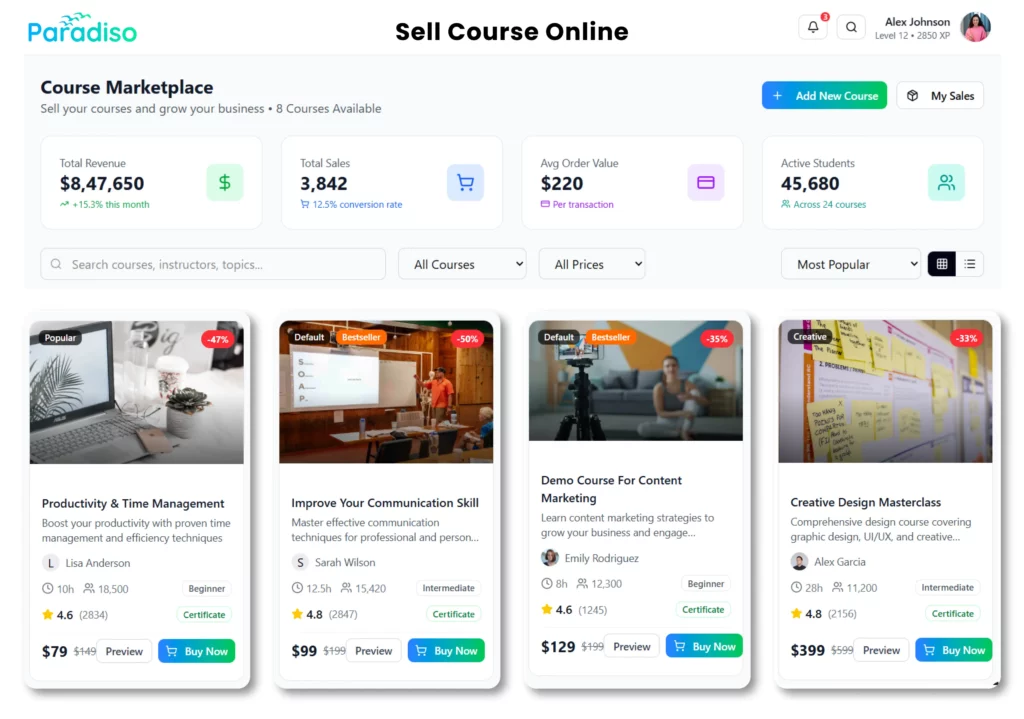Online learning has gained popularity since the late 1990s due to its convenience, flexibility, and affordability. Know a days more people are turning to online learning platforms to continue their education and training. As a result, it has made these platforms one of the most in-demand products globally.
Choosing the right online learning platform can be overwhelming because of the countless options available, each with unique features. However, whether you’re a business looking to train employees or work in the academic sector, we’ve got you covered. Keep reading to learn about the best online learning platforms available in the marketplace.
What is an Online Learning Platforms?
Online learning platforms are systems that allow students to take courses online in a secure environment. These platforms are also known as ‘online course marketplaces’ as they enable learners to search for and purchase online courses directly. While some of the best online learning platforms allow people to create and sell courses, most focus on providing university-level education.
Online learning platforms give you access to a vast library of courses you can take from the comfort of your home or anywhere with internet access. It is a great way to learn new skills, advance your education, or earn a degree without attending a physical school or university.
Online Learning Platform Vs Online Course Platforms
Online learning platforms and online course platforms are two terms that are often used interchangeably, but they have different perspectives. Online learning platforms focused on the learner’s perspective, while online course platforms focused on the instructor’s perspective.
Online learning platform allows students to find educational content, search, and purchase courses or programs. On the other hand, for instructors, it is the place to deliver knowledge and sell courses.
Choosing online learning platforms for business can save a lot of work on audience building, marketing, and sales, but you may need more control over pricing, user data, and branding. In contrast, online course platforms offer greater flexibility and freedom to manage learning resources and course materials. Additionally, you have more control over the design and promotion of your courses and website. Ultimately, the choice of which platform to use depends on the needs of your business.
Best Online Learning Platforms for Personal and Professional Development
There are several popular and highly regarded online learning platforms available. Here are some of the best ones:
- Coursera
- Skillshare
- Open edX
Coursera

Coursera is a popular online education platform with over 82 million users, providing high-quality courses in partnership with universities and businesses. It offers individual courses, certifications, and degree programs for bachelor’s and master’s degrees. Coursera delivers unlimited access to 90 percent of its learning programs through a yearly or monthly subscription. In addition, students can join paid courses and receive certifications from top institutions globally.
Pros:
- Delivers a range of learning alternatives and engagements
- Grants students with diverse forms of credentials
- Offers top-notch learning tools and trainer communication
Cons:
- Course creation options are more limited in comparison to other online learning platforms.
- Restricted to instructors associated with affiliated institutions
Who is it for?
- For learners: Anyone seeking high-quality education from renowned institutions, whether for individual courses, certifications, or degrees.
- For educators: It has been Designed for professors affiliated with a partner institution or business.
Skillshare

It is a popular online course marketplace offering over 35,000 lessons in creative fields. With more than 5 million students, the courses are short and consist of small videos, class projects, and a student community to interact with through discussion forums. Professionals and industry leaders teach Skillshare classes, which are divided into four categories: creative arts, technology, business, and lifestyle.
Pros:
- It provides short and easy-to-understand learning modules.
- Includes a helpful community forum where learners can give and receive feedback.
- Offers the option to take multiple courses for a single fee.
Cons:
- Course material is limited to four categories only.
- No formal recognition or certificate of completion was provided.
Who is it for?
- Learners: Those interested in creative arts, technology, business, or lifestyle courses.
- Educators: Those in creative fields seeking additional income can earn through Skillshare’s royalty and referral program.
Open edX
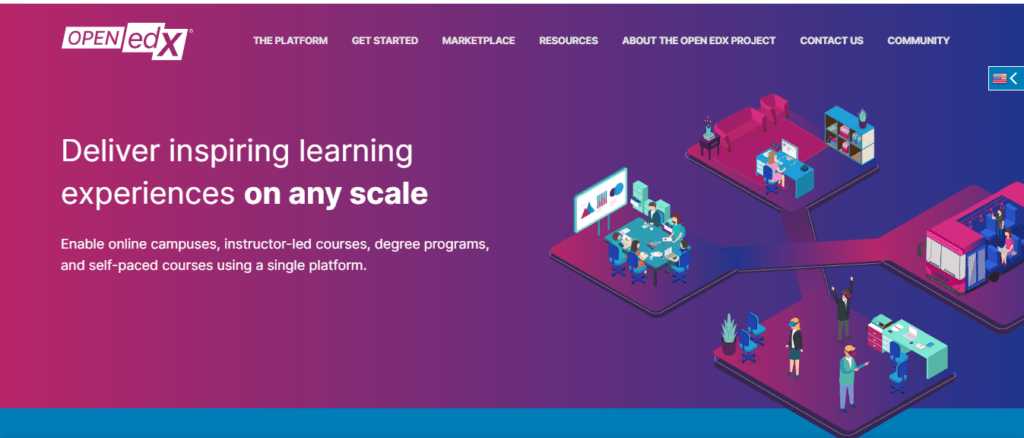
This online learning platform offers online courses from multiple universities and is an open-source content management system. It was created by a team of scientists from Harvard University and MIT to provide university-level education worldwide. With over 3,500 courses from 160 top businesses and universities, it covers various subjects, including engineering, computer science, data science, math, humanities, business, and management.
Pros:
- The free and open-source platform
- Self-hosted servers and maintenance entail additional costs.
- Provides valuable in-depth knowledge
- Interactive online classes with mobile app support
Cons:
- Outdated discussion forums and challenging navigation
- Technical expertise or hiring a developer is needed for the implementation.
- Self-hosted server maintenance adds to the cost.
Who is it for?
- Students: Suitable for diverse learners of all ages looking to learn a subject or new skills.
- Leaners: Ideal for businesses with a team or those who can outsource the development and maintenance of the platform on their servers.
What is an Online Course Platform? and how will it help someone to be successful?
An online course platform is a tool that helps you create, sell and teach your online course to students. Think of it as a virtual classroom where you can teach your students through videos, slides, presentations, text, and other course materials. Your students will learn using an online learning management system (LMS) where they can watch videos, take notes, complete exercises, and take quizzes and assessments.
The best thing about using an online course platform is that you don’t have to worry about the technical details. You can focus on creating quality course content while the platform takes care of the hosting, domain name, landing page design, video hosting, and other features like quizzes, surveys, shopping carts, and email marketing.
With an online course platform, you can make your courses available to anyone with an internet connection, and you can reach a global audience. The platform provides a complete solution for course creation, marketing, and sales. Whether you’re an expert in your field, a teacher, or a trainer, you can use an online course platform to share your knowledge and skills with others.
Best Online Course Platforms for Effective Learning
Online course platforms serve as the foundation of the eLearning industry, catering to startups and corporations in creating their own online education platforms, marketplaces, and training facilities.
With online course platforms, you can establish your academy while retaining complete control over branding, pricing, and user data. If you want to create an online academy, an online course platform is ideal.
We will explore some of the best online course platforms that can help you embark on a journey of effective learning and personal growth.
- Paradiso LMS
- Thinkific
- Teachable
- Kajabi
- Podia
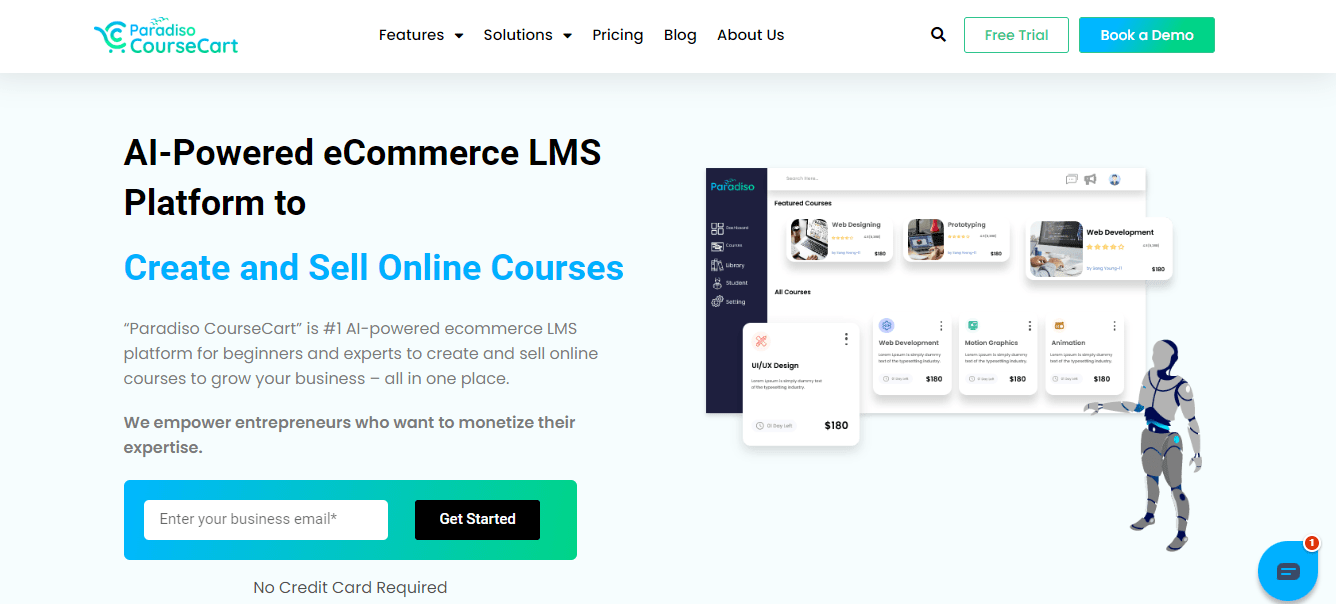
This AI-powered e-commerce LMS platform offers a complete solution to build your online academy and create, market, and sell unique interactive learning experiences. It brings all the required tools in one place, making creating online courses affordable, quick, and accessible. In addition, it offers advanced features to manage your academies, such as mobile learning, monitoring learners’ performance, accessing in-depth course analytics, and more. The platform is designed to provide the most advanced capabilities to manage an academy and create engaging and interactive courses.
Benefits:
- Built-in eLearning Authoring Tool
- Multiple Course Types
- Third-Party Content Embedding
- Pre-installed payment gateways
- Multiple Currency Support
- Automatic Taxes
- Manage Payments & Invoices
- Completion Certificates
- Integrate Marketing Tools
Who is it for?
It suits entrepreneurs, educators, small/medium businesses, professional trainers, and companies looking to train employees or educate customers.

Thinkific is a self-contained online course platform offering everything necessary to create and sell online courses. In addition, the platform has a user-friendly interface for developing courses and rich multimedia resources to incorporate into course content, making it an ideal solution for entrepreneurs and businesses looking to establish an online education enterprise.
Pros:
- Comes with a landing page builder to create web pages for selling courses
- Provides built-in sales and marketing tools to help instructors market their courses
- Offers various integrations with popular software to enhance functionality
- Assists in building an online learning community through features such as discussion forums and user groups.
Cons:
- Website design control is limited
- Building complex courses can be challenging
- It does not support SCORM, TinCan, or AICC
- Lacks social features
- Emphasis is on sales rather than learning
Who is it for?
It is ideal for individuals, small to medium-sized businesses, and coaches seeking additional income.

It is a user-friendly online teaching platform that enables instructors to turn their expertise into a profitable business. It simplifies uploading course material, personalizing the virtual classroom, and interacting with learners.
Pros:
- Course authoring made effortless with built-in quiz functionality
- Landing page editor and blogging features available
- Built-in eCommerce capabilities for easy selling and buying of courses
- Marketing, sales, and affiliate tools provided within the platform
- Email marketing tool integrated into the platform for communication with students
Cons:
- Learning, teaching, and assessment features are restricted
- SCORM or TinCan is not supported
- Limited options for customization of landing pages and branding
- Absence of social or community-building features
- Customer support is not very responsive
- Options for white labeling are limited.
Who is it for?
It is ideal for solo entrepreneurs, coaches, creatives, and new course creators.
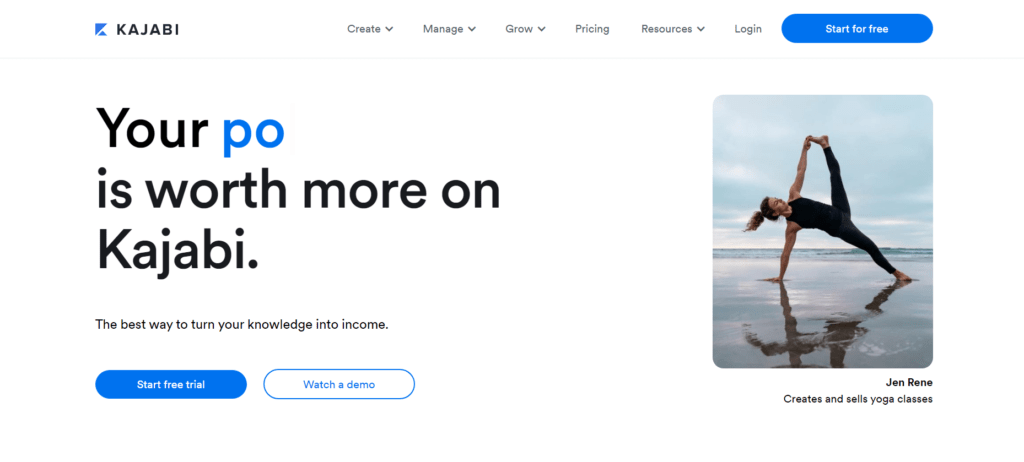
Pros:
- Built-in email and marketing tools available
- Integrations with popular software offered
- Sales pipelines/funnels can be created within the platform
- Collection of aesthetically pleasing themes provided
- Landing pages can be created using the platform.
Cons:
- Setup can be challenging
- Most expensive pricing options available
- Limited control and customization options for website design
- Fewer course creation and learning features compared to other online learning platforms
- Emphasis on small digital product sales rather than courses.
Who is it for?
It is suitable for non-techy individuals such as freelancers, creators, entrepreneurs, and small businesses, selling simple courses and downloads.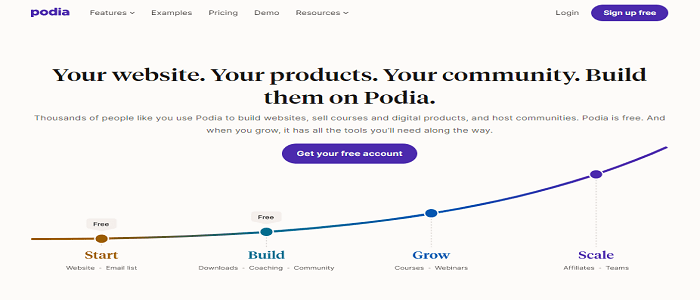
An e-learning platform that simplifies the creation and sale of courses, memberships, and digital products. Free tools and resources are available for entrepreneurs.
Pros:
- Extremely user-friendly and straightforward
- Customization options available for sales pages
- Website builder included in the platform
- Email and affiliate marketing features provided within the platform
- Own membership subscription can be created.
Cons:
- Platform lacks a community section
- Missing learning tools such as grading, assessments/assignments, and certificates
- SCORM or TinCan is not supported
- Limited capabilities, suitable for more minor video-based learning, coaching, and downloads only
- No white-labeling option available.
Who is it for?
It is ideal for artists and content creators looking to monetize their knowledge and content through gated videos and simple learning activities.
LMS Vs Online Course Platform : The Key Differences
Online course platforms are a type of software that enables instructors to create, host, deliver, and sell online courses. It falls under the learning management systems (LMS) primarily used by businesses to train employees and academic institutions to support teaching and customer education. While LMS is typically used for renowned enterprises, course platforms are used by small to medium-sized businesses, individuals, and even academic institutions.
Online Course platforms are cloud-hosted software that enables instructors to create online classes or individual lessons by uploading various types of content such as text, images, video, PDF files, and audio. The benefit of using a course platform is that individuals or small businesses can create their online course marketplace instead of offering courses on popular course marketplaces like Paradiso LMS. This way, they have complete control over revenue and user data, which they would not have otherwise.
Best Traditional Learning Management Systems (LMS)
Below is List of Traditional Learning Management Systems (LMS) :-
- Docebo
- LearnUpon
- Litmos
- iSpring Learn
- Talent LMS
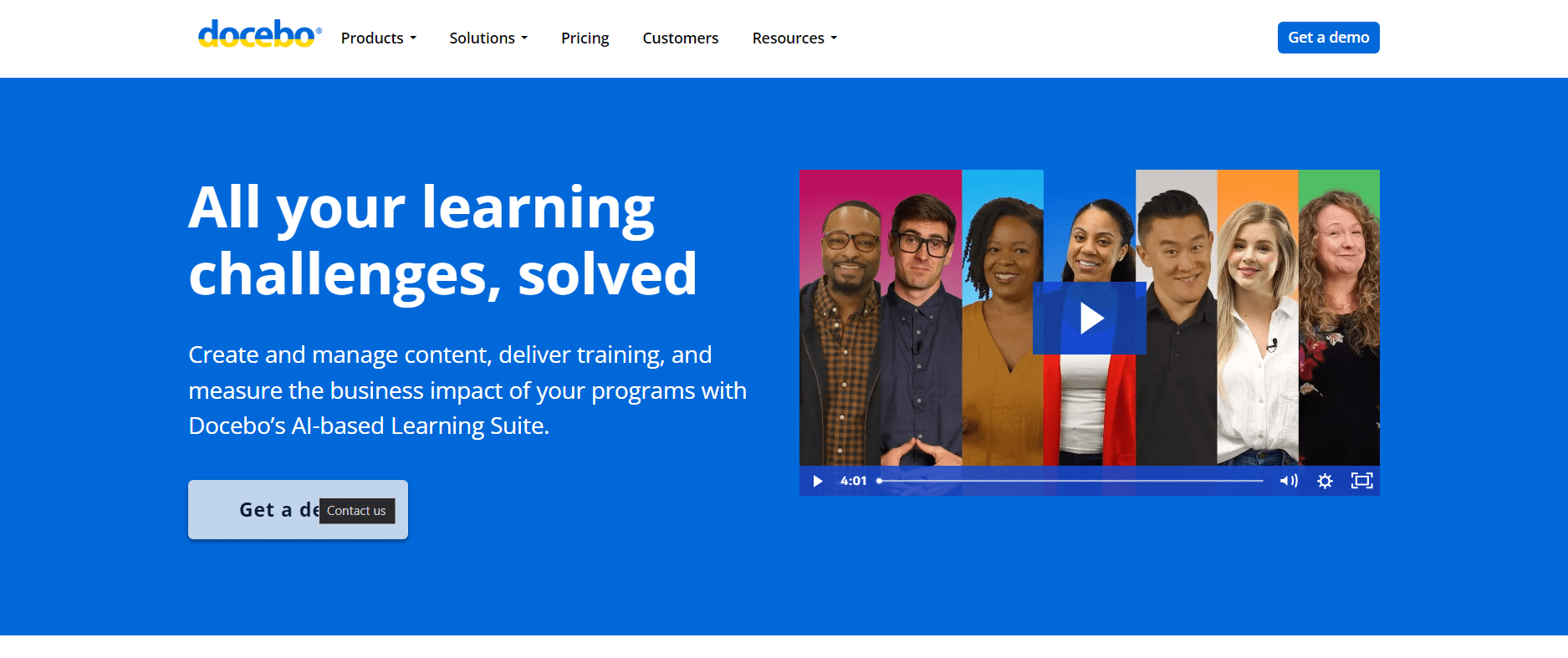
This cloud-based learning management system platform offers a comprehensive solution for most organizational training requirements. The learner-centric platform uses AI algorithms to personalize the learning experience and provides L&D capabilities. As a result, top companies, including Sharp and Bloomberg, trust it.
Pros:
- Supports SCORM 1.2 and 2004 editions, AICC, and Tin Can API
- Offers gamification and social learning features
- Provides analytics to assess the effectiveness of learning programs
- Allows for offering certificates and selling courses online
Cons:
- Limited reporting customization options
- Lacks advanced API functionality for particular learning management system objects
- Inadequate features on the standard package for small and medium-sized businesses
Who is it for?
The platform is designed for HR professionals and large enterprise departments to manage employee training and development programs.
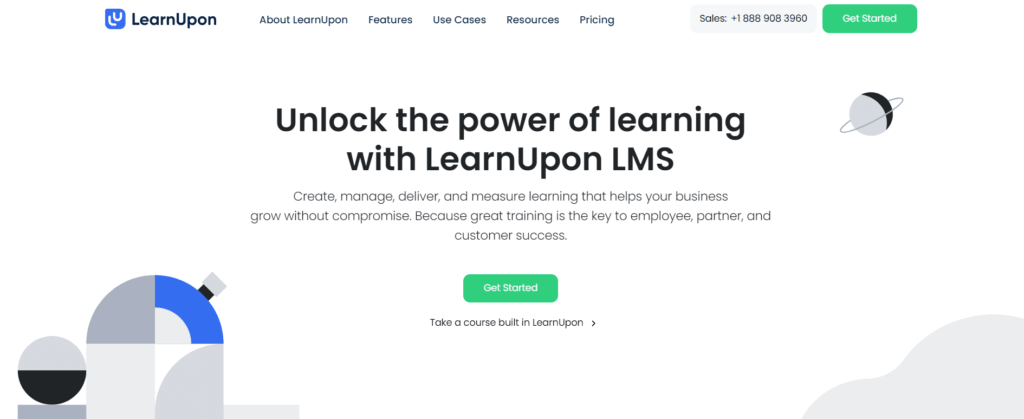
This cloud-based platform is ideal for educational, corporate, customer, and partner training. It is renowned for its user-friendly interface, multilingual support, and advanced features such as audience segmentation and custom learning paths. These make it an excellent choice for delivering effective and targeted training programs.
Pros:
- Provides engaging gamification features
- Includes eCommerce capabilities
- Supports SCORM and xAPI/Tin Can API
- Enables integration with various third-party tools
- Allows for multi-audience support with multiple portals
Cons:
- Pricing plans are expensive
- No HTML5 course option available
Who is it for?
It is ideal for businesses and educational institutions of all sizes and types.
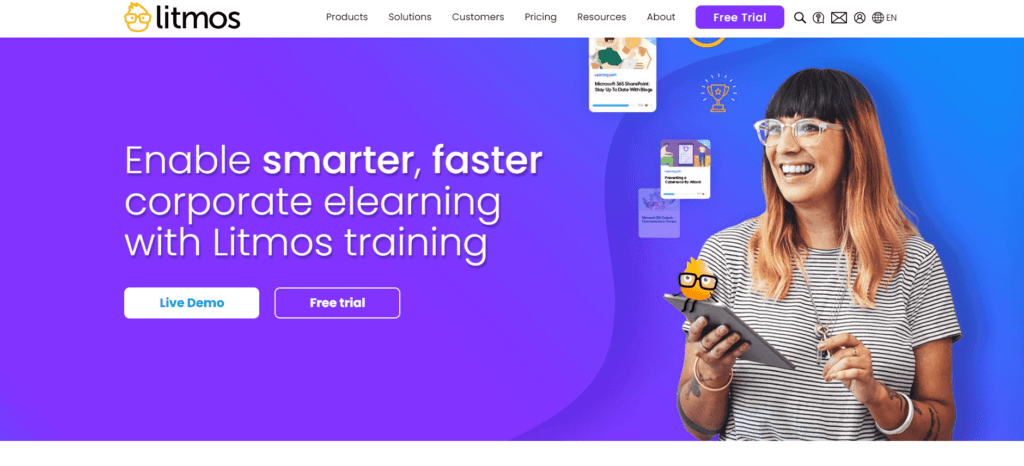
This platform provides diverse eLearning solutions for businesses, such as corporate, customer, partner, and compliance training. It enables customized learning paths to suit each company’s and its employees’ needs and styles.
Pros:
- It comes with an easy-to-use course builder and built-in authoring
- Supports SCORM, AICC, xAPI/Tin Can API
- Provides built-in reporting, dashboards, and social communication features
- Offers eCommerce and third-party integrations
- Enables personalized learning paths to be created.
Cons:
- Customization options are limited
- Interface not as attractive as competitors
- Expensive depending on business needs
- The assessment and feedback delivery process is slow
- No dedicated payment gateway connection
Who is it for?
This platform is suitable for organizations of any size and type, primarily focusing on corporate training.
iSpring Learn
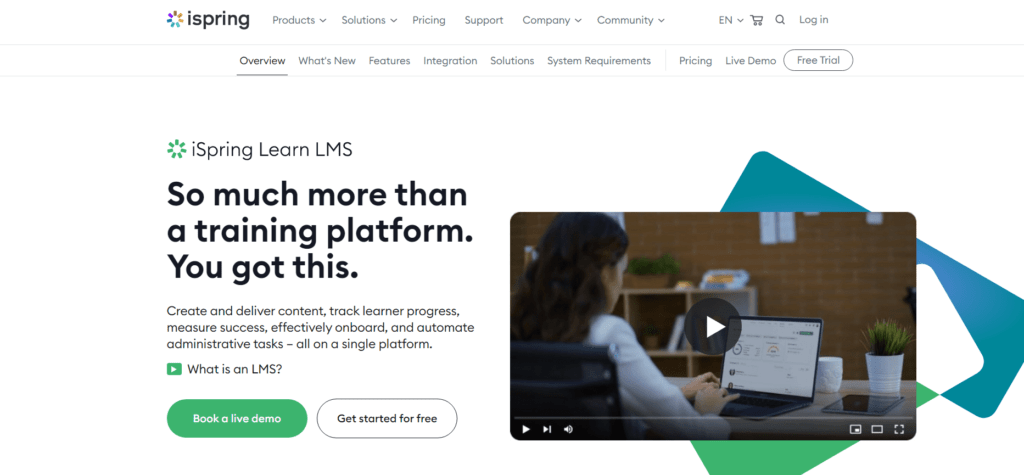
It is an LMS suitable for corporate training programs, offering various pricing plans and tools to fit different budgets and learning needs. Although it is affordable for smaller businesses, it needs some advanced features available in other LMS options.
Pros:
- It comes with a user-friendly learner interface
- Supports SCORM, AICC, and xAPI/Tin Can API
- Integrates with authoring tools and supports blended learning
- Allows offline and mobile access for convenient learning
- Features automated course management to streamline administrative tasks
Cons:
- Lacks multilingual support
- No direct messaging between learners in discussion forums
- Limited design customization, branding, and API options
- Limited eCommerce capabilities and integrations
Who is it for?
It’s appropriate for businesses of all forms and sizes.

This cloud-based learning management system option is popular among businesses and serves 70,000+ teams worldwide. It enables online course creation and offers possibilities for organizing, delivering, and customizing course content and website design to scale your business.
Pros:
- Simple course creation across various categories
- Includes a mobile application
- SCORM, CMI5 & xAPI content compatibility
- Provides TalentLibrary, a compilation of pre-built courses
Cons:
- Customer support service is not very responsive
- Limited options for course setup and content variety
- Discussion forums have limited functionality
Who is it for?
This LMS solution caters to businesses and organizations of all sizes, from SMEs to large enterprises, that aim to train customers, employees, and partners.
Our choise for the best online course platform
If you want to create and sell online courses, using an online course platform like Paradiso LMS is an excellent option. A course platform is an all-in-one solution to help you easily create, promote, and sell online courses. Unlike a standard learning management system (LMS), which is specialized for academic institutions and enterprises, a course platform is designed for entrepreneurs, course creators, training organizations, and small to medium-sized enterprises (SMEs).
Paradiso LMS is an AI-powered eCommerce LMS platform providing robust features, course authoring, user analytics, and website-building capabilities. It means you don’t have to worry about building your website or setting up complicated payment systems. With Paradiso LMS, you can create and sell online courses all in one place. It’s an excellent option for beginners and experts alike.
Why should you choose Paradiso LMS?
Built-in Authoring tool Create online Courses in Minutes.
Build interactive & engaging courses online using the AI-powered Course Authoring tool built in Paradiso LMS—the best feature is AI Course Generator, which helps you create interactive lessons in minutes by adding a topic name. You can make changes in videos, templates, quizzes, and assessments using an editor, publish content in SCORM format, and embed it on any site.
Bespoke Storefronts to help you Sell Courses Online
Create a customized storefront to sell your courses online by following these steps. Start by defining your branding, including colours, typography, and logo. Choose an e-commerce platform like Shopify or Teachable that supports digital products. Design your storefront with attractive banners, images, and a user-friendly layout that incorporates your branding. Organize your courses logically and provide clear descriptions. Integrate a secure payment gateway such as Stripe or PayPal.
Implement customer management features for registrations and account management. Optimize your storefront for search engines by using relevant keywords. Offer customer support through contact forms or live chat. Test and optimize your storefront regularly, and market your courses to increase visibility and conversions.
Learner Analytics and Dashboard for Digital Business
By implementing learner analytics and a dashboard within your Learning Management System (LMS), you can gain valuable insights to enhance the learning experience for your users. Collect relevant data on course progress, completion rates, and engagement metrics. Choose a suitable analytics tool and define key metrics aligned with your learning objectives. Analyze and visualize the data through interactive dashboards, enabling learners to track their progress and access course materials. Use the insights gained to make informed decisions and improve the effectiveness of your online courses.
Choosing an Online Learning Platform
Paradiso LMS learning brings together the best of both classroom learning and eLearning. Our LMS combines the support of classroom learning with the flexibility of online education. Blended Learning uses Paradiso Learning Management System to teach and support learning in a classroom. With Paradiso LMS, learners can access high-quality course materials, course calendars and assignments at any time they wish.
For example, if you want to try Paradiso LMS, our all-in-one online course platform, we offer a Schedule A Demo Call. It’s ideal for creating, selling, and delivering online courses.














